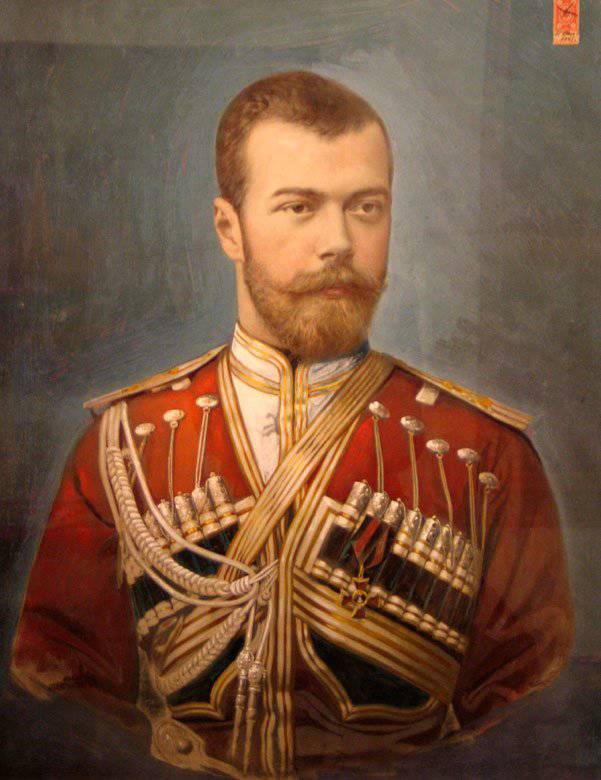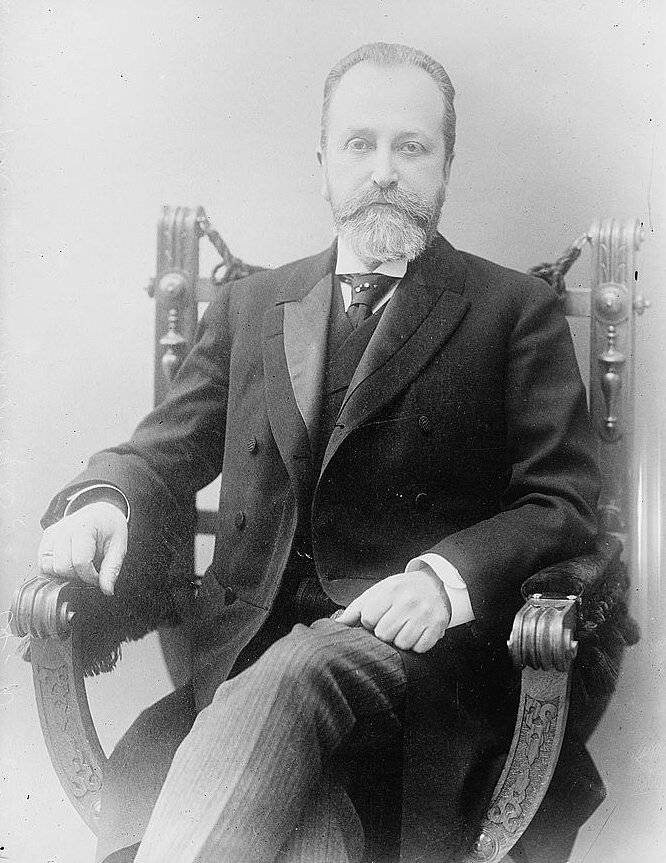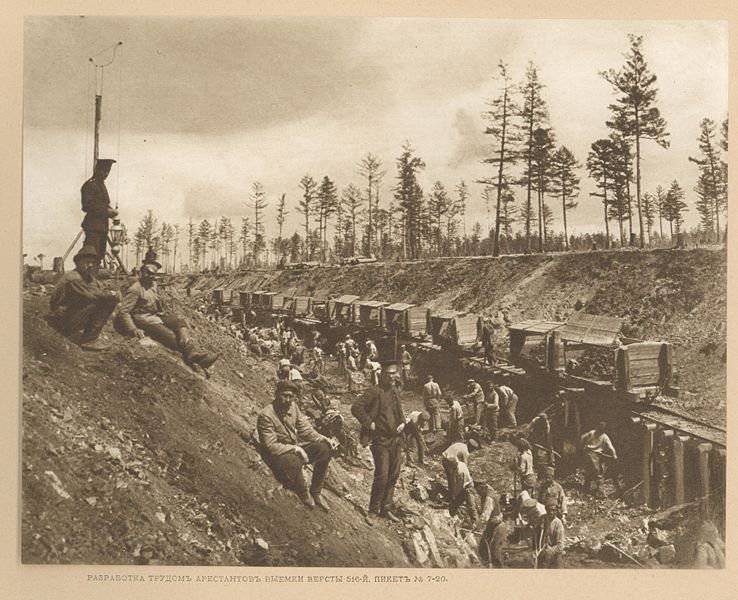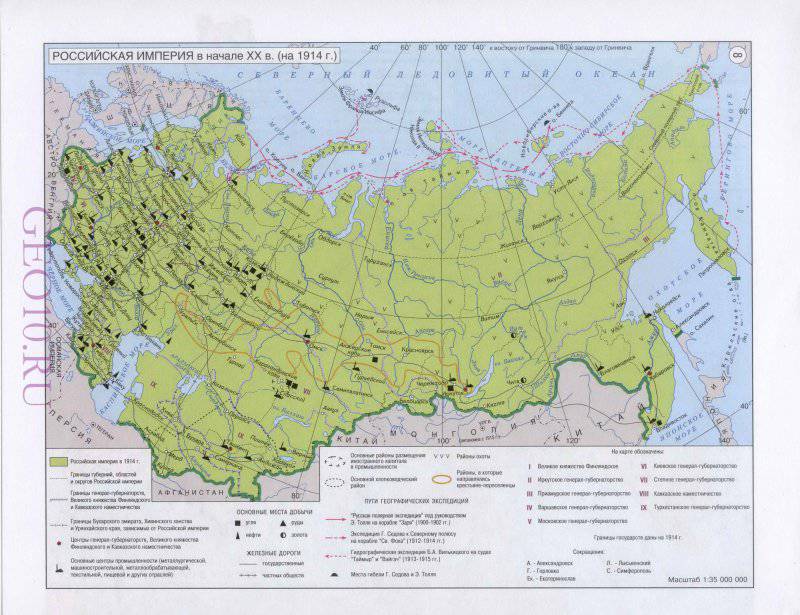Russian Empire on the Eve of World War

What was the Russian Empire on the eve of world war? Here it is necessary to distance oneself from two myths - the Soviet, when “Tsarist Russia” is shown as a backward country with a downtrodden people, and “Novorossiysk” - the essence of this legend can be expressed by the name of the documentary-publicistic film of the Soviet and Russian director Stanislav Govorukhin (1992). This is an idealized view of the Russian Empire, which was destroyed by villains Bolsheviks.
The Russian Empire really had great potential and could, with appropriate global, foreign and domestic policy, become a world leader, by virtue of its human reserves (the third largest in the world by population, after China and India), natural wealth, creative potential and military power. But there were powerful, deep-seated contradictions that eventually destroyed the empire building. If there were no such internal preconditions, the subversive activities of the financial international, Western special services, masons, liberals, socialist revolutionaries, nationalists, and the like enemies of Russia would not have been successful.
The cornerstones of the Russian Empire were: Orthodoxy, which preserved the foundations of Christianity as the basis of the system of upbringing and education; autocracy (autocracy) as the basis of the state system; Russian national spirit, which was the basis for the unity of the vast territory, the core of the empire, at the same time capable of mutually beneficial cooperation with other races, ethnic groups and religions. But these three foundations were largely undermined: Orthodoxy for the most part became a formality, having lost its fiery spirit of righteousness, for rites the essence was lost - "The Glory of Truth, Righteousness." The Russian national spirit was eroded by the pressure of Westernism, as a result there was a split of the people - the elite (for the most part) adopted European culture, for it Paris and the Cote d'Azur became closer than Ryazanschina or Pskovshchina, and Marx and Voltaire more interesting than Pushkin or Lomonosov.
Economic development of Russia At that time, it was ambivalent, on the one hand, success was high. The empire experienced three economic upheavals - the first was under Alexander II, the second at the end of 19 and the beginning of 20 centuries (was associated with the stability of the era of Emperor Alexander III and a number of positive innovations like the introduction of protectionist tariffs and a wine monopoly, policies to promote entrepreneurship, etc.), the third the rise took place in the 1907-1913 years and, interestingly, continued even during the First World War and was connected with the activities of PA Stolypin and VN Kokovtsev (Minister of Finance 1906 —1914, Chairman of the Council of Ministers in 1911 - 1914 go s). The average annual growth rate in the last period was 5-8%. This rise was even called the “Russian miracle”, which occurred much earlier than the German or Japanese.

Count Vladimir Nikolaevich Kokovtsov, Russian statesman, Chairman of the Council of Ministers of Russia in 1911 — 1914.
For 13 pre-war years, industrial output has tripled. Particularly rapidly grew new industries - chemical production, oil production, rapid growth was recorded in coal mining. Railways were built: from the 1891 to the 1916 years, the Trans-Siberian Railway was built (the Trans-Siberian Railway, or the Great Siberian Route), it connected Moscow and the largest Siberian and Far Eastern industrial centers of the empire, effectively pulling Russia into an iron belt. It was the longest railway in the world - more than 9 thousand. Km. The South-Eastern Trans-Siberian Railway became the China-Eastern Railway (CER), built in 1897 — 1903. It belonged to the Russian state and was served by the subjects of the empire. Passed through the territory of Manchuria and connected Chita with Vladivostok and Port Arthur.
In the field of light, textile (textiles exported to China and Persia), the food industry Russia fully provided itself and exported goods to the external market. A more negative situation was in the field of engineering - Russia produced itself 63% of equipment and means of production.
Great fears of Western economists and politicians caused the rapid development of Russia. In 1913, the Russian Empire ranked first in the world, ahead of the United States, in terms of industrial production growth. Russia was among the top five economic powers, second only to Britain, Germany, catching up with France and the United States. According to French economists, if Russia maintained the pace of such development, while other powers maintained the same speed of development, by the middle of the 20th century, the Russian state would have to dominate the world financially and economically, i.e. politically, becoming the number one superpower.
And this is despite the fact that it is somewhat wrong to compare Russia and the British and French colonial empires - Paris and London pumped out money from the colonies, the subordinate territories developed one-sidedly, only in their own interests. Of the overseas possessions of the British and French received a huge amount of cheap raw materials. The Russian empire developed in other conditions — the outskirts were considered Russian and they were tried to be developed on the same level as the Great Russian, Little Russian provinces. In addition, it is necessary to take into account the natural and climatic conditions of Russia - there is an excellent book by A.Parshev “Why Russia is not America” about this. Developing a high civilization in such conditions is an order of magnitude more difficult than in Europe, the USA or the countries of South Asia, Latin America and Africa.
It is necessary to take into account the fact that, although the colonies worked for France and England, researchers forget to include the population of Egypt, India, Sudan, Burma and the masses of other possessions in gross figures per capita, take into account their standard of living, well-being, education and so forth. . And without colonies, the level of development of the "metropolis" really turned out to be high.
A certain danger to Russia was represented by relatively high financial indebtedness. Although it is not worth “to go too far” and assume that the empire was almost an “appendage of Western countries”. The total foreign investment ranged from 9 to 14%, in principle, not much higher than in Western countries. It is necessary to take into account the fact that Russia developed according to the capitalist scheme, was not a socialist state, and therefore played the same games as the western countries. Russia's external debt to 1914 reached 8 billion francs (2,9 billion rubles), while the external debt of the United States reached 3 billion dollars (approximately 6 billion rubles), the States were in debtors at that time, breaking the trend only due to the First World War.
It was believed that it was more profitable to borrow, money went to the development of the country, major infrastructure projects or stabilization of the financial situation in 1905-1906 years (defeat in the war, the beginning of the revolution in the country). By the beginning of World War I, the gold reserve of the Russian Empire was the largest in the world and amounted to 1 billion 695 million rubles.
The population of the empire was 160 million people and grew rapidly, the birth rate was high - 45,5 children per 1 thousand inhabitants annually. The myth about the general ignorance and low culture of the Russian people at the beginning of the 20 century also causes doubt. Western researchers, speaking of 30% literate, mainly took into account graduates of high schools, gymnasiums, real schools, Zemstvo schools. Parish schools, which covered a significant part of the population, in the West seriously did not accept, considering that they do not give “real education”. Again, it is necessary to take into account the factor of mass illiteracy of the inhabitants of the European colonies, who legally and in fact were part of European countries. In addition, in 1912, in the Russian Empire, a law was passed on universal primary education and on elementary schools. If it were not for the war and the collapse of the empire, the same would be done in the empire that the Bolsheviks did - illiteracy would be completely eliminated. Therefore, complete illiteracy persisted only among foreigners (a category of subjects within the framework of the law of the Russian Empire, which did not bear derogatory significance) of a number of areas of the empire, in the North Caucasus, Central Asia, Siberia and the Far North.
In addition, the imperial gymnasiums and real schools (secondary education) gave a level of knowledge that was approximately equal to the volume of programs of most modern universities. And the person who graduated from a higher education institution in Russia differed for the better in terms of knowledge level than most of today's high school graduates. The Silver Years experienced the culture of Russia - successes were noted in poetry, literature, music, science, etc.

Parliamentary monarchy. You need to know that by the beginning of the 20 Russia Russia was no longer an absolute monarchy, in the full sense of the term. In 1864, during the course of judicial reform (the Judicial Charter was introduced), the power of the emperor was actually limited. In addition, the country began to introduce local government, which was in charge of improvement, health, education, social protection, etc. The Manifesto of 17 of October 1905 of the year and the reforms of 1907 of the year established a regime of parliamentary constitutional monarchy in the country.
Therefore, the citizens of the empire owned about the same amount of rights and freedoms as the inhabitants of other great powers. The Western “democracy” of the beginning of the 20 century was very different from the modern one. The right to vote was not universal, the majority of the population did not have this privilege, their rights limited age, property, sex, national, racial and other qualifications.
In Russia, since 1905, all parties have been allowed, except for those who conducted terrorist activities, which is quite normal. Both the Bolsheviks and the Social Revolutionaries fell into the State Duma. Strikes were suppressed in all countries (and even now they are suppressed), and often in the West the actions of the authorities were more severe. In Russia, preliminary censorship was abolished, which was used by numerous opponents of the regime, from liberal masons to leftists and nationalists. There was only punitive censorship - the publication could be fined or closed for violating the law (such censorship was widespread and existed not only in Russia). Therefore, one must know that the myth of the "prison of nations", where the king is "chief overseer", was invented by the Western press and was later supported in Soviet historiography.
Foreign policy
Petersburg tried to pursue a peace-loving policy. At the two Hague Conferences (1899 and 1907), which were convened at the initiative of Russia, adopted international conventions on the laws and customs of war included in the set of norms of world humanitarian law.
In 1899, 26 countries participated in it, adopted 3 conventions: 1) About the peaceful solution of international clashes; 2) On the laws and customs of land warfare; 3) On the application to the naval war began the Geneva Convention (from 10 August 1864 year). At the same time, the use of projectiles and explosives from balloons and vessels, projectiles with asphyxiating and harmful gases, explosive bullets was banned.
In 1907, 43 states took part in it, they have already adopted 13 conventions, including on the peaceful solution of world clashes, on limiting the use of force in collecting contractual debt obligations, on the laws and customs of land warfare, etc.
Russia after the defeat of France in the Franco-Prussian war 1871-1871 several times kept Germany from a new attack on the French state. Petersburg tried to resolve disputes on the Balkan Peninsula by political and diplomatic means, without bringing the matter to war, even to the detriment of its strategic interests. In the course of the two Balkan wars (1912-1913), because of the peace-loving policy, all the countries of this region, even the Serbs, were dissatisfied with Russia.
Although the society was “infected” with Francopilia and Pan-Slavism, the Russian public did not want a big war in Europe. The nobility and intellectuals considered Paris to be the cultural center of the world. It was considered a sacred duty to defend the “brothers-Slavs” or “brothers by faith”, although there were plenty of examples when these “brothers” entered into alliances with Western countries and acted contrary to the interests of Russia.
For a long time Germany, up to 1910-1912, was not perceived by the enemy in Russia. They didn’t want to fight the Germans, this war did not bring Russia good, but it could bring much harm (as it happened).
But Paris and London had to push the “Russian giant” with the “Teutons”. The British were afraid of the growth of the sea fleet German Empire, German dreadnought could seriously change the balance of power in the world. It was the fleet that allowed the "mistress of the seas" to control the vast expanses of the planet and its colonial empire. They needed to provoke a conflict between Germany and Russia and, if possible, stay away. So, Sir Edward Gray (British Foreign Minister in 1905-1916) told the French President Poincare: "Russian resources are so great that in the end Germany will be exhausted even without the help of England."
The French were dual to the war, on the one hand, there was no “Napoleonic” militancy, and we didn’t want to lose the achieved level of well-being (France was the world cultural and financial center), but they could not forget the shame of 1870-1871 in Paris. The topic of Alsace and Lorraine was regularly raised on the shield. Many politicians openly led the country to war, among them was Raymond Poincare, who was elected president in 1913. In addition, many did not like to live under the Damocles sword of Germany, the German empire provoked the beginning of the conflict several times, and only the position of Russia and Britain restrained the belligerent impulses of Berlin. I wanted to solve the problem with one blow.
Great hope was on Russia. In Paris, many believed that if the "Russian barbarians" would break off the leash, then Germany would end. But Russia was fairly stable, and neither the Moroccan crises (1905-1906, 1911) did not shake its peace-loving position, nor the turmoil in the Balkans (1912-1913).
Russia's peace-loving nature is confirmed by the fact that if Germany began to prepare for war and arm itself intensively, to build a more and more powerful fleet almost immediately after defeating France in the 1871, then Russia only in the 1912 took the shipbuilding program. And even then it was much more modest than the German or British, on the Baltic forces 4 battleships and 4 battlecruisers were only enough to defend their shores. In March 1914 of the year (!), The State Duma adopted a large military program, which envisaged an increase in the army and the modernization of armaments, as a result, the Russian army had to surpass the German one. But both programs should have been completed only by 1917 year.
In September 1913, Paris and St. Petersburg reached a final agreement on cooperation in case of war. France was to begin military operations on the 11 day after the start of the mobilization, and Russia on the 15. And in November, the French gave a large loan for the construction of railways in the west of the empire. To improve the mobilization capabilities of Russia.
Domestic opponents of the Russian Empire
- A significant part of the imperial elite. The February 1917 revolution was staged not by a Bolshevik or a Social Revolutionary, but by financiers, industrialists, part of the generals, high dignitaries, officials, deputies of the State Duma. It was not the red commissars and Red Guards who recanted the throne of Nicholas II, but ministers, generals, deputies, masons of high initiation levels who were well-to-do and arranged for life.
They dreamed of making Russia “sweet” by England or France, their consciousness was shaped by the matrix of Western civilization. Autocracy seemed to them the last obstacle to Western Europe. They were supporters of the "European choice" of Russia at that time.
- The bourgeoisie is foreign, mostly Germans and Jews. Many entered the Masonic lodges. Had contacts abroad. We also dreamed of the “European choice” of Russia. They were supported by the liberal bourgeois parties - the Octobrists and the Cadets.
- A significant part of the Russian national bourgeoisie. In large mass, these were Old Believers (Old Believers). The Old Believers considered the Romanovs power to be anti-Christian. This power split the church, violated the proper development of Russia, subjected them to persecution, destroyed the institution of the patriarchate and nationalized the church. Petersburg implanted western abominations in Russia.
- Most intellectuals It was at the heart of a Westerner, cut off from the people, a terrible mixture of Voltaires, Hegels, Mars and Engels reigned in their heads ... The intelligentsia was fascinated by the West, dreamed of dragging Russia into Western civilization and implanting it there. In fact, the intelligentsia was “anti-people” (despite its high level of education), there were few exceptions like Leo Tolstoy or Leskov, and they could not change the general western motion vector. The intelligentsia did not understand, did not accept the Russian civilization project, therefore, taking part in stirring up the fire of the revolution, it itself burned down.
- Professional revolutionaries. These were passionaries of all classes and classes, they were united by a thirst for change. They rejected the modern world completely. These people believed that they could create a new world, much better than before, but for this to happen, the old one must be completely destroyed. Among them were Russians, Jews, Poles, Georgians, etc. This movement was not united, consisted of many parties, organizations, factions.
- Jews. This nation has become an important factor in the Russian revolution; one should not downplay their significance, but one should not exaggerate either. They constituted a significant part of revolutionaries of all stripes. Moreover, it should be noted that these were not Jews in the traditional sense of the word. For the most part, these were the "crust", the "outcast" of their tribe, those who did not find themselves in the traditional life of the Jewish townships. Although they used connections among relatives, including abroad.
- Nationalists. Polish, Finnish, Jewish, Georgian, Armenian, Azerbaijani, Ukrainian and others. The nationalists became a powerful factor in the collapse of the empire, on which the Western powers relied.
Documentary, historical film 2007 of the year. Director: Nikolay Smirnov. Famous historians, journalists, writers, analysts and military experts took part in the creation of the documentary series. The first film tells about Russia of the late XIX - early XX century.

Information